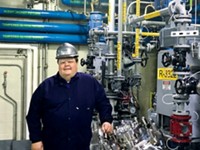Advertisement
Grab your lab coat. Let's get started
Welcome!
Welcome!
Create an account below to get 6 C&EN articles per month, receive newsletters and more - all free.
It seems this is your first time logging in online. Please enter the following information to continue.
As an ACS member you automatically get access to this site. All we need is few more details to create your reading experience.
Not you? Sign in with a different account.
Not you? Sign in with a different account.
ERROR 1
ERROR 1
ERROR 2
ERROR 2
ERROR 2
ERROR 2
ERROR 2
Password and Confirm password must match.
If you have an ACS member number, please enter it here so we can link this account to your membership. (optional)
ERROR 2
ACS values your privacy. By submitting your information, you are gaining access to C&EN and subscribing to our weekly newsletter. We use the information you provide to make your reading experience better, and we will never sell your data to third party members.
Business
Who wants to buy Teva’s API business?
Drug company is selling its active ingredient division at a tough time for the sector
by Aayushi Pratap
March 11, 2024
| A version of this story appeared in
Volume 102, Issue 8

The world’s number two producer of active pharmaceutical ingredients (APIs) is for sale. Given the constant global demand for essential medicines, the business might seem like a lucrative asset. But with low profit margins and fierce competition in the sector, suitors could actually be few and far between.
On Jan. 31, Israel’s Teva Pharmaceutical Industries announced plans to divest its API business, dubbed TAPI, to reallocate financial resources to its innovative and generic drug segments.
TAPI may be big, but it has been struggling lately. While Teva’s overall sales jumped 7% in 2023 compared with 2022, third-party sales by its API segment plummeted 16%, to $568 million. The business also supplies Teva’s generic drug–making division.
Teva’s API arm has 4,300 employees and produces some 350 active substances used mainly to make small-molecule generic medicines. It has 13 manufacturing facilities globally, most of which are in Europe. The company has sold plants in the past. For example, Teva sold two of its sites to the Italian firm Flamma Group, one in 2019 and another in 2022, the latter of which was an API facility in Italy.
Michael Quirmbach, CEO of CordenPharma, a Switzerland-based drug ingredient maker, says the increase in energy and raw material costs due to the war between Russia and Ukraine has affected many European manufacturers.
But CordenPharma and most other European drug-ingredient firms focus on making APIs for customers’ patented drugs. For instance, CordenPharma produces the active ingredient in Eli Lilly and Company’s popular diabetes drug Mounjaro. These firms, known as contract development and manufacturing organizations (CDMOs), make molecules that face no direct competition and can be sold for high prices. TAPI, in contrast, makes mainly APIs for generic drugs not protected by patents, a much more cutthroat business.
Quirmbach says firms like Teva must contend with the tremendous rise in competition from Indian and Chinese API makers, who have the advantage of low labor costs, enabling them to produce high volumes and sell at low prices. “It just makes it really hard to compete with that. Pressures will continue to grow in this business,” he says.
Malcolm Rosenthal, an industry consultant and founder of RoseChem Group, says overcrowding in the small-molecule generic drug industry is another reason for low profit margins for the API producers that supply it. Generic-medicine makers buy APIs to create copies of drugs whose patents have expired. Rosenthal says the space is hypercommoditized, resulting in low prices for generics and even the exit of several US-based players. “Even if a company’s generic drug gets approved, you realize 10 other companies are getting the same approval on the same day,” he says.
Other Europe-centric companies selling into the generics market are also struggling. For instance, EuroAPI, a Sanofi spin-off, recently took drastic steps to cut down on its API business, announcing that it will discontinue 13 APIs with low or negative profit margins. It also plans to divest API sites in England and Italy and possibly close two workshops at its site in Frankfurt, Germany. EuroAPI says it will focus on profit-making large-molecule drugs such as vitamin B12, prostaglandins, peptides, and oligonucleotides, as well as CDMO services. There is little evidence to suggest that Teva has taken similar steps.
Instead, Teva is placing its bets on its roster of innovative drugs for respiratory, neurodegenerative, and neuropsychiatric indications and on producing biosimilars of products like AbbVie’s Humira. To make resources available, the company wants to complete the sale of its API business by 2025, but it is unclear who will buy it.
Investment in the pharmaceutical services sector by private equity (PE) firms has ramped up and could represent an exit strategy for Teva, Quirmbach says. For example, in 2023, Bain Capital acquired Fabbrica Italiana Sintetici, an Italian pharmaceutical chemical producer, for an undisclosed sum.
But Ken Drew, a vice president at Flamma, says firms are being extremely cautious about where they invest. “Even private equity–owned CDMOs are struggling in the current market, as they aren’t seeing many projects,” he says, adding that he doubts a PE company would be interested in Teva’s API business.
The other possibility is that Teva sells the business to another drug ingredient firm or a CDMO. UK-based Sterling Pharma Solutions, which provides a range of pharmaceutical services, including API manufacturing, has made a couple of such acquisitions in the past. In 2023, it bought an API facility in Ringaskiddy, Ireland, from Novartis, and in 2019, it acquired CiVentiChem’s North Carolina pharmaceutical chemical facility.
Teva does have options, but Rosenthal thinks that for a business with multiple production sites and people across several continents, the exit won’t be an easy one.





Join the conversation
Contact the reporter
Submit a Letter to the Editor for publication
Engage with us on Twitter